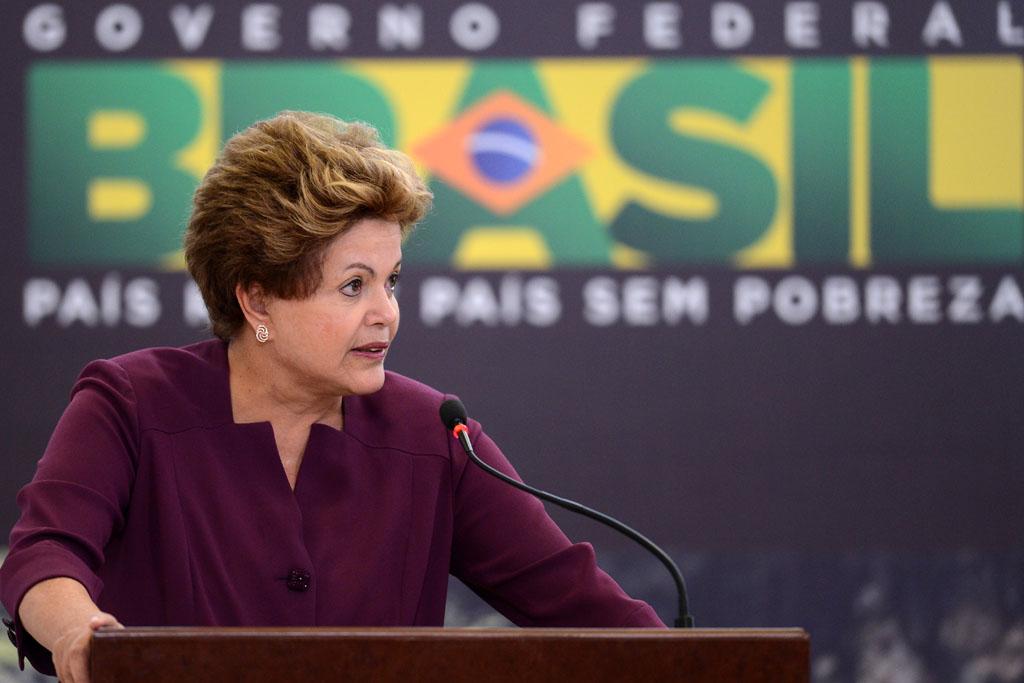5 reasons Latin America is lashing out at the UN General Assembly (VIDEO)
Brazilian President Dilma Rousseff delivers a speech during a ceremony at Planalto Palace in Brasilia, on June 18, 2013. Rousseff said on Sept. 4, 2013, she wants and explanation and public apology for alleged NSA spying on her private communications.
MEXICO CITY, Mexico — Intended as a forum to set the United Nations' agenda for the coming year, the General Assembly also provides the world's 193 national leaders an excellent venue in which to vent.
For Latin America's heads of state, especially those of the leftist persuasion, that means complaining about their giant and often intrusive neighbor to the north.
The various US government spying scandals, and President Barack Obama's push to punish Syria for alleged chemical weapons use, are providing plenty of fodder this year.
1. Rousseff’s rage
Speaking just before President Obama on Tuesday morning, Brazilian President Dilma Rousseff launched a fierce attack on the US spying, which reportedly included tapping into her private emails. Rousseff postponed a planned state visit to Washington over the affair and remains angry.
"Meddling in such a manner in the lives and affairs of other countries is a breach of international law," Rousseff complained in her address Tuesday morning. "As such, it is an affront to the principles that should otherwise govern relations among countries, especially among friendly nations.
"In the absence of the right to privacy, there can be no true freedom of expression and opinion, and therefore no effective democracy," Rousseff said, recounting her own history as a guerrilla leader who fought against Brazil's military dictatorship. "In the absence of the respect for sovereignty, there is no basis for the relationship among nations.
2. Morales’ morals
Bolivia's Evo Morales, long a critic of Washington, seconded Rousseff's complaint and piled on a couple of his own.
He is still plenty angry about having his plane diverted to Vienna during a flight home from Moscow in early July. US and European officials suspected that Morales was giving fugitive National Security Agency whistleblower Edward Snowden a lift to South American asylum.
Arriving for the General Assembly, he repeated a call Monday for moving the United Nations out of New York bcause "we don't feel safe here."
"The center of insecurity is in the United States through the fault of the US government," Morales told reporters on Monday.
Last week, Venezuela alleged that US officials blocked the jet of Venezuelan President Nicolas Maduro, an ally of Bolivia, from entering Puerto Rican airspace en route to Beijing. Morales threatened "to prepare an international lawsuit so that Obama and his government are judged for their crimes against humanity."
Under late President Hugo Chavez, who died in March, Venezuela became a close ally of Syria and a sharp critic of the United States. Chavez was also famous for bluster at the UN, once insinuating George W. Bush was satan who'd left a stench of sulfur at the podium.
Maduro, Chavez's successor and onetime top diplomat, had been expected to join the South American presidents in complaining about Washington this week. But he is furious over US refusal to grant visas to some members of his delegation for the UN visit. He returned to Venezuela from China on Wednesday, throwing his UN appearance in doubt.
3. Fernandez’s financial fury
Argentina's Cristina Fernandez de Kirchner groused about world financial markets, which for many means the Wall Street firms lurking a walk across Manhattan from the UN's east side complex.
"We have been serial victims of lobbyists, of vulture funds, of those who bought bonds at knockdown prices," Fernandez said, referring to the more recent of her country's many economic crises. "That is the story of Argentina; but could be the story of any other country."
Argentina's leader, however, could perhaps be emboldened by a recent green shoot in her country's often hobbled economy: its gross domestic product grew 8.3 percent last quarter, the fastest pace in about two years.
4. Santos’ session
Chiming in from the opposite side of the political arch, Colombia President Juan Manuel Santos demanded the world's respect for his government's effort to negotiate an end to the half-century civil war with various leftist guerrilla groups.
"We ask that you join us, but respect our desions and our way of making peace," Santos told the assembly.
But pointing out that the rebels in recent years have been largely financed by the cocaine trade with the US and Europe, Santos echoed a growing Latin American demand for new anti-drug strategies.
Reform ideas include legalizing narcotics, something Washington won't abide, for now.
"If we act together on the drug problem, with a comprehensive vision, devoid of ideological biases, we will be able to prevent much harm and violence," Santos said.
5. Piñera’s plea
Finally, conservative Chilean President Sebastian Piñera called for expanding the permanent UN Security Council to include more members from the Southern Hemisphere and to end the veto by which the five victors of World War II hold ultimate control over the UN's ability to act during crises.
"So that the most important decisions concerning international security, which inevitably affect us all ultimately, can be adopted by large and forceful majorities truly representative of the community of nations," Piñera said.
"If we advocate democracy, dialogue and participation when we govern our countries," he said, "I see no reason not to apply these same principles and values when we take decisions affecting the whole world."
Follow the speeches live below.
Every day, reporters and producers at The World are hard at work bringing you human-centered news from across the globe. But we can’t do it without you. We need your support to ensure we can continue this work for another year.
Make a gift today, and you’ll help us unlock a matching gift of $67,000!
